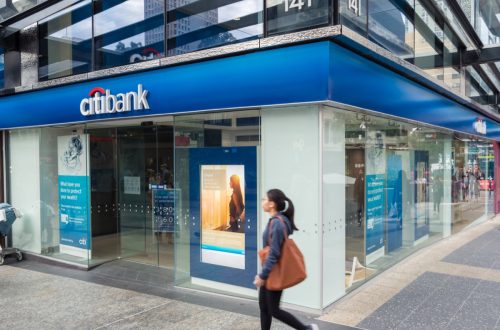Chase and Citi Customers Say Their Accounts Are Being Closed Without Warning

We put a lot of faith into our checking and savings accounts. Unlike cash, we don’t physically see the money there—we just trust that it’s secure. No one wants to run their card at the grocery store or try to pay rent at the beginning of the month only to discover that their accounts are no longer functional. But some people banking with major institutions report troubling recent experiences. Read on to find out more about the Chase and Citi customers who say their bank accounts were closed without warning.
RELATED: 6 Banks, Including Wells Fargo and Bank of America, Closing Branches This Fall.
Chase and Citi serve hundreds of millions of customers combined.

JPMorgan Chase and Citibank are two of the largest banking institutions around the world—and they’re certainly two of the most popular choices in the U.S. In terms of consumer and community banking, JPMorgan serves nearly 80 million households, according to the the company’s website. Citi, on the other hand, currently has around 200 million customer accounts, according to a press release from the company.
It’s impossible to deny the wide reach of these two banks. But news of accounts being closed without warning could be cause for concern for their many customers.
RELATED: Bank of America Planning to Close Another 20 Branches—Here’s Where.
Customers claim their accounts are being closed abruptly.

In a Nov. 5 report, The New York Times revealed that it had examined over 500 cases of customers being dropped by their banks. And several of those claims come from Chase and Citi customers.
Caroline Potter told the newspaper that her Citibank accounts were shut down abruptly last year, while Steven Ferker said he was booted by Citi after withdrawing money in 2016 and 2017 to help fund services for the new house he had bought in New York.
Ferker said he was surprised that the bank called to ask why he was making repeated cash withdrawals—which he made in chunks of $7,000 to $12,000 to pay his contractor, who had requested cash payments—but he explained the situation each time.
“I assumed they were calling to make sure someone was not stealing my money, and I was glad that they called,” he told the NYT. “But I never gave it two thoughts until they threw me out.”
And it’s not just Citi customers. Bryan Delaney, who has owned several New York City bars, and his business partner Jennifer Maslanka, told the newspaper that Chase abruptly closed the bar’s account this year, along with personal checking and credit-card accounts for Delaney, his wife, and Maslanka.
Meanwhile, Nigeria native Oore Ladipo, who had been contract working as a data analyst at Morgan Stanley in New York while working on his master’s degree, received an offer for a permanent position when he graduated. But Ladipo wasn’t able to start for a few months as he waited to receive his employment documents from the federal government, so his parents wired him around $1,500 a month from Nigeria to help him make rent in early 2018.
That summer, Chase sent him letter saying his accounts would be shuttered, according to the NYT. “They were aware of my study, work and family history but still closed my account after almost 10 years,” Ladipo told the newspaper, noting that he had banked with Chase since he moved to Ohio in 2010 for college.
RELATED: Major Banks Won’t Stop Shutting Down Branches—Here’s Why.
They say they aren’t offered real explanations for the closures.

For these customers, this scenario can play out in a few different ways, according to The New York Times. They may get a letter from their bank saying that all of their checking and savings accounts are being closed with an explanation—if there is one—that typically lacks any useful detail. Or they don’t see the letter or never receive one, and then discover that their accounts no longer work while trying to access them.
In Potter’s case, it started on the phone. “There were these weird calls with a very mysterious customer care department, and they kept asking for our tax returns. No one sees my tax returns except the IRS and my CPA,” she told the NYT.
According to Potter, she and her husband moved to Idaho during the pandemic, selling their old house in New York and buying a new one—which required large chucks of money to be moved between their Citibank accounts. Despite being a typical occurrence for banks, Potter said that Citi suddenly shut down everything, and the couple’s attempts to get an explanation were futile.
“It felt like there was this secretive department, and anyone who wasn’t in that department didn’t even know about it,” she said.
Meanwhile, Ferker said his letter from Citi offered no explanation, and the manager at his branch had an equally frustrating response. “The answer was: ‘Don’t ask me. Ask the computer that flagged you,'” Ferker told the NYT.
Ladipo shared a similar sentiment, adding that he felt confused and betrayed by the abrupt closure from Chase. “And in this scenario, you can’t really negotiate,” he said. “You aren’t talking with a person who has the power to tell you what went wrong and what didn’t go wrong.”
Chase said it only closes accounts after “appropriate review.”

As The New York Times explained, these abrupt account closures are what banks refer to as “exiting” or “de-risking,” with the goal to crack down on fraud, terrorism, money laundering, human trafficking, and other crimes. But banks appear to be evicting an increasing number of individuals, families, and small-business owners who often have no idea why their banks turned their back on them, per the NYT report.
These evictions are usually the result of red flags, or transactions that appear out of character, which are algorithmically generated. But banks won’t say how often they are closing accounts this way or tracking how often they get it wrong.
“There is no humanization to any of this, and it’s all just numbers on a screen,” Aaron Ansari, who used to program the algorithms that flag suspicious activity, told the NYT. “It’s not ‘No, that is a single mom running a babysitting business.’ It’s ‘Hey, you’ve checked these boxes for a red flag—you’re out.'”
When Best Life reached out about the report, Citi declined to comment. But Jerry Dubrowski, a spokesman for JPMorgan Chase, said that “accounts are closed only after appropriate review and consideration of the facts,” as the company aims to create long-term relationships with its clients.
“When we have concerns about a client’s transactions—such as when someone may be using our bank or our customers to commit potentially unlawful activity, or when we receive information from law enforcement—we act in accordance with our compliance program, consistent with our regulatory obligations,” Dubrowski said. “We know that can be frustrating to clients, but we must follow those obligations.”
RELATED: For more up-to-date information, sign up for our daily newsletter.